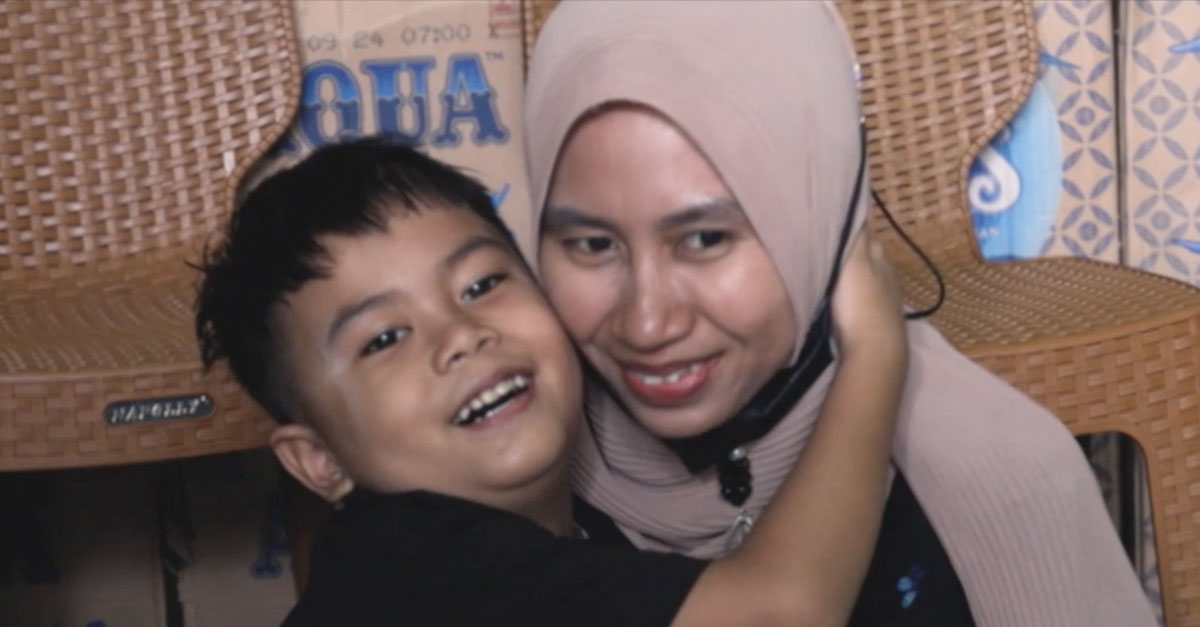Last month, team members from the WFH Humanitarian Aid Program and WFH USA visited the Haikal family in Indonesia, to see how WFH Humanitarian Aid Program donations were making a difference in the life of Azreal, a five-year-old boy with severe hemophilia A. Those in attendance included Cesar Garrido, WFH President; Glenn Pierce, MD, PhD, WFH Vice President, Medical; WFH USA board member Mark W. Skinner; and Assad Haffar, MD, WFH Medical & Humanitarian Aid Director.
The WFH Humanitarian Aid Program donations have had a huge impact on Azreal’s day-to-day life. He is on prophylactic treatment, which means that he is able to go to school, play with friends, and do normal activities like any boy his age. It made such a difference in his life that early on his mother committed to bringing him to another village every 12 hours so that he could receive treatment. Eventually, she asked the nurses in the hemophilia treatment centre (HTC) at Dr. Cipto Mangunkusumo National Central Public Hospital in Jakarta to teach her how to infuse Azreal herself so she could do it at home. That took two months—but once she became proficient, the ability to practice home care greatly eased the burden of hemophilia on the family. Besides saving time and money, it also makes it easier for her and her husband to work and support the family.
Although he’s only five, Azreal is aware of the difference the donations are making in his life. He knows it’s making him better, and he will even request infusions if he feels unwell. All in all, access to treatment is something he sees positively in his life.
Prophylaxis means bleeds are a rarity for Azreal. This contrasts strongly to his earlier childhood when spontaneous acute bleeds would drastically impact the whole family, demanding constant attention for days at a time. At one point at the height of the COVID-19 pandemic, Azreal had a severe bleeding episode that necessitated a hospital stay that lasted two months. During that period, his parents couldn’t even be near him because of social distancing protocols. Fortunately, he recovered and was able to go home to his parents and his sister, all of whom play a part in his care. Prophylaxis for Azreal means he’s able to do to school every day without missing any class.
To watch the full video about Azreal, please click here or watch it above.
Over 4 million IUs of factor were donated to Indonesia through the WFH Humanitarian Aid Program in 2022. Since 2015, 16.5 million IUs have been delivered. To find out more about the WFH Humanitarian Program, please click here.
About the WFH Humanitarian Aid Program
The WFH Humanitarian Aid Program improves the lack of access to care and treatment by providing much-needed support for people with inherited bleeding disorders in developing countries. By providing patients with a more predictable and sustainable flow of humanitarian aid donations, the WFH Humanitarian Aid Program makes it possible for patients to receive consistent and reliable access to treatment and care. None of this would be possible without the generous support of Sanofi and Sobi, our Founding Visionary Contributors; Bayer, CSL Behring and Roche, our Visionary Contributors; Grifols, our Leadership Contributor; and Takeda and Japan Blood Products Organization, our Contributors. To learn more about the WFH Humanitarian Aid Program, visit www.treatmentforall.org.













